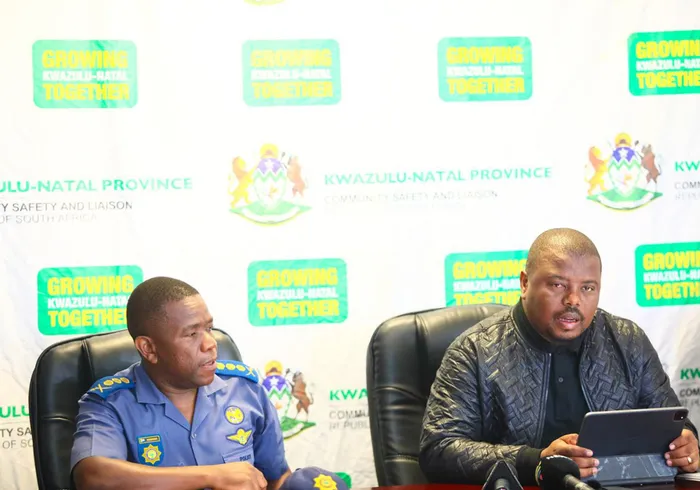Several polling stations flagged as high risk by IEC

Provincial police commissioner Lieutenant-General Nhlanhla Mkhwanazi, left, with MEC for Transport, Community Safety and Liaison, Sipho Hlomuka, at a media briefing on the security state of readiness for the upcoming elections. Picture: Supplied
Several polling stations in the province have been designated as high risk by the Electoral Commission of South Africa (IEC) following a comprehensive assessment by police.
This revelation was made by provincial police commissioner Lieutenant-General Nhlanhla Mkhwanazi during a state of readiness media briefing convened by the MEC for Transport, Community Safety and Liaison, Sipho Hlomuka, on Monday.
He divulged that more than 215 of the 4 874 polling stations in KwaZulu-Natal were high-risk.
“These stations are in different parts of the province in all 11 districts. In the medium-risk category, there are 1 064 stations,” said Lieutenant-General Mkhwanazi.
He said their plan included prioritising high-risk voting stations, additional deployments to hotspot areas, deployment of police in all voting districts, deployment of more than 17 000 police and other security personnel, deployment of 1008 social crime prevention volunteers from the Department of Community Safety and Liaison, ensuring effective monitoring of all voting stations, placing roving teams on high alert to respond to emergency cases, setting up special courts to deal with cases speedily, activating political parties through the multi-party political intervention committee to respond to threats and possible incidents of instability.
Mr Hlomuka said the justice and security cluster had also identified the rural town of Nongoma as a hotspot, attributing this to recent political killings that have claimed the lives of councillors and traditional leaders in the area.
“Areas such as Nongoma will receive maximum attention. Nongoma and some parts of Zululand want to categorise themselves as no-go areas, but there is no area in the province which should be no-go,” said Mr Hlomuka.
He assured the public of heightened police visibility across the province, with random operations including stops and searches of vehicles.
“We will leave nothing to chance. People must expect police visibility across the province.”
He also warned against depriving citizens of their right to vote through road closures and property destruction, citing the recent incident on the R74 in Muden where a truck was torched.
“We understand the protest was a result of service delivery issues as people were without water. Any acts or threats of violence and intimidation have no place in our province and will not be tolerated,” Mr Hlomuka said.
A multiparty political intervention committee has been meeting to address incidents of political tension and will continue to meet urgently whenever there is a threat of political instability. This committee aims to craft political strategies at district and voting station levels.
Mr Hlomuka praised the committee and traditional leaders for their efforts in promoting harmony ahead of the elections by educating and engaging communities about peace-making and political tolerance. He expressed optimism that political parties are committed to ensuring stability.
With special voting set to begin on Monday May 27, Mr Hlomuka said the provincial authorities are ready and will work closely with the IEC and other bodies observing the elections. “Voting stations and warehouses storing voting material will be protected and secured. We are assuming maturity from all the political parties,” he said.
Mr Hlomuka has instructed officials to ensure all road infrastructure leading to voting stations is accessible and that district teams are on standby to respond to any weather conditions.
“People who voted in 1994 will notice a clear and visible change in infrastructure delivery,” he said.